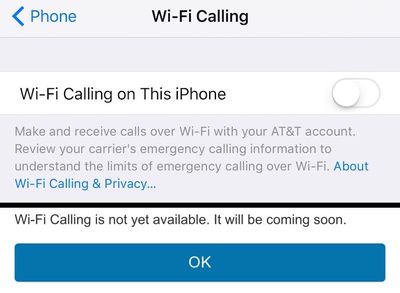Originally tested in an iOS 9 public beta back in August, AT&T ultimately held back on a wide public release for Wi-Fi calling due to its decision to wait for an FCC waiver that would temporarily relieve the carrier of needing to offer support options for deaf and hard-of-hearing people. The Federal Communications Commission's rules state that all calling services need support for a teletypewriter (TTY) service for the deaf, but AT&T wants the old-fashioned TTY replaced with real-time text (RTT) support instead.
Both TTY and RTT offer support for the deaf and hard-of-hearing to conduct non-voice conversations, but AT&T's RTT service wouldn't be ready until 2016, leading to the carrier's request for a temporary waiver from needing to implement TTY support until then. Yesterday, AT&T resubmitted its request for such a waiver to get its Wi-Fi calling service off the ground, simultaneously calling out Sprint and T-Mobile for deciding to move forward with similar services without supporting the FCC's rules (via Fierce Wireless).

The company stated that the original launch date for Wi-Fi calling was set to be September 25, alongside the launch of the iPhone 6s and iPhone 6s Plus, but without the proper waiver from the Federal Communications Commission, the carrier decided to hold off on the launch of the service for now.
"This past Friday, September 25, was the date on which AT&T intended to introduce Wi-Fi calling services in competition with other competitors in the market, namely T-Mobile and Sprint," AT&T wrote in its filing. "Those carriers have been offering Wi-Fi calling services for a significant period of time, well over a year on Android devices and for months on iOS devices.
Neither of those carriers has approached the FCC to request a waiver of the TTY rules. Because the commission has not granted AT&T's waiver petition, we are not in a position to provide Wi-Fi calling services to our customers even while our competitors provide those services in defiance of the commission's rules."
Wi-Fi calling was introduced into the iOS ecosystem with iOS 8 and lets calls be placed over Wi-Fi instead of a cellular network so users can take advantage of a potentially faster Wi-Fi signal when their carrier's connection strength is particularly weak. Since the feature was made available in the iOS 9 public beta, a limited number of AT&T subscribers have been able to test out Wi-Fi calling on their iPhones despite AT&T's delay of the full rollout.

















